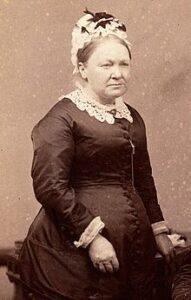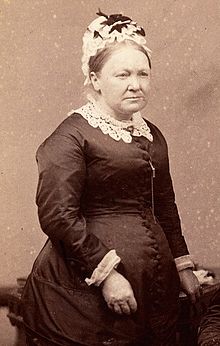by Emma|Book Around the Corner
 French blogger Emma follows up her review last year of Catherine Helen Spence’s Mr Hogarth’s Will (1865) with a review of Spence’s An Autobiography (1910).
French blogger Emma follows up her review last year of Catherine Helen Spence’s Mr Hogarth’s Will (1865) with a review of Spence’s An Autobiography (1910).
Catherine Helen Spence (1825-1910) was a Scottish-born Australian writer, journalist, social worker and political militant. After reading her novel Mr Hogarth’s Will (1865), a novel I described as Austenian, feminist and progressist, I wanted to know more about the woman who wrote it [and so discovered An Autobiography, completed from her diaries after her death by her companion Jeanne Lewis, and readily available on-line.]
 CH Spence was born in Melrose, Scotland in 1825, in a family of eight. Her father was a banker and a lawyer. In 1839, after her father lost the family fortune, they emigrated to Australia and settled in Adelaide (South Australia). She belonged to a progressive family and benefited from a solid education. Her grandfather experimented with new agricultural methods. He left his farm in the hands of his daughter while he was pursuing other business ventures. In her family, women were part of the family business and not confined to domestic duties.
CH Spence was born in Melrose, Scotland in 1825, in a family of eight. Her father was a banker and a lawyer. In 1839, after her father lost the family fortune, they emigrated to Australia and settled in Adelaide (South Australia). She belonged to a progressive family and benefited from a solid education. Her grandfather experimented with new agricultural methods. He left his farm in the hands of his daughter while he was pursuing other business ventures. In her family, women were part of the family business and not confined to domestic duties.
The capacity for business of my Aunt Margaret, the wit and charm of my brilliant Aunt Mary, and the sound judgment and accurate memory of my own dear mother, showed me early that women were fit to share in the work of this world, and that to make the world pleasant for men was not their only mission.
Her family was very religious (I didn’t understand what religious current it was) and it weighed on her vision of life. She says:
I was 30 years old before the dark veil of religious despondency was completely lifted from my soul, and by that time I felt myself booked for a single life. People married young if they married at all in those days. The single aunts put on caps at 30 as a sort of signal that they accepted their fate; and, although I did not do so, I felt a good deal the same.
She became Unitarian after settling in Australia and never married. From what she writes, I don’t think it was a real issue for her. She had the examples of two very active single aunts with full lives and made a lot of her own. She wrote books, did a lot of social work and was a strong advocate of effective voting. She also raised several orphaned children.
CH Spence writes about her literary career and the difficulty to have one when living in Australia, so far from London. I enjoyed the passages about Mr Hogarth’s Will and her experience as a writer. There are interesting passages about how much she earnt when she sold her novels and how precarious was her manuscripts’ journey to London. I loved her offhanded comment about classics
With all honour to the classical authors, there are two things in which they were deficient—the spirit of broad humanity and the sense of humour.
She knew French and could read books in the original:
It was also from Mrs. Barr Smith that I got so many of the works of Alphonse Daudet in French, which enabled me to give a rejoinder to Marcus Clark’s assertion that Balzac was a French Dickens.
Cheeky me wonders: why wouldn’t Dickens be an English Balzac? After all Father Goriot was published before Oliver Twist.
Besides literature and journalism, Spence explains her social work to improve the lives of women and children in South Australia. With Emily Clark they founded and promoted a system to take children out of destitute asylums and have them raised in approved families. I guess we call it foster care nowadays.
She also fought for a change of the voting system and advocated the Thomas Hare scheme. This is exposed in Mr Hogarth’s Will too and I confess that I didn’t understand the details of the scheme or the voting system in place at her time. The crux of the matter was to change from the current system that was not truly representative of the population to an enlarged pool of voters. Another battle was to obtain the secret ballot. As a feminist, she also petitioned for woman suffrage but thought that it was useless until effective voting was in place.
CH Spence travelled to England and Scotland, visiting the family. She also visited France and Italy. She went to the USA in 1893. She toured the country as a feminist speaker and mad a lot of public interventions. She also visited the Chicago World’s Fair. Imagine that she may have crossed the path of Marie Grandin, a Parisian lady who was at the fair too and wrote about it.
Spence’s autobiography lets the reader hear her voice, the voice of a caring, intelligent and energetic woman. She had strong beliefs and values and put her heart in the causes she chose to advocate. She fought all her life for effective voting. She was still on the board of various social services when she was in her seventies.
I’m glad I read Spence’s autobiography because there were a lot of interesting information in it but it’s not exactly a smooth read. Her prose is a bit heavy and sounds more like an account than a story. She mentions many people that didn’t mean anything to me. They may be famous Australians but as a French reader, it only slowed my reading and it became tedious at times. It feels like she was writing for her contemporary readership and not for posterity. It’s her legacy, an homage to her family, her friends and partners in all her social and political endeavours.
It is also a valuable account of Australia in the 19th century, especially South Australia and Melbourne. However, there is not a word about indigenous people. They don’t exist, it’s like Australia was a desert island at the disposal of colonizers.
My favourite parts were about literature, her comments on writing and characterization, the origin of her novels and her literary interests. I leave you with a last quote for the road, as I know there are many Austen fans out there.
About this time I read and appreciated Jane Austen’s novels—those exquisite miniatures, which no doubt her contemporaries identified without much interest. Her circle was as narrow as mine—indeed, narrower. She was the daughter of a clergyman in the country. She represented well-to-do grownup people, and them alone. The humour of servants, the sallies of children, the machinations of villains, the tricks of rascals, are not on her canvas; but she differentiated among equals with a firm hand, and with a constant ripple of amusement. The life I led had more breadth and wider interests. The life of Miss Austen’s heroines, though delightful to read about, would have been deadly dull to endure. So great a charm have Jane Austen’s books had for me that I have made a practice of reading them through regularly once a year.
Catherine Helen Spence
An Autobiography
first pub. 1910
Available from Project Gutenberg (here) and also in –
Ever Yours, C.H. Spence, An Autobiography (1825-1910), Diary (1894) and Some Correspondence (1894-1910)
Edited by Susan Magarey, with Barbara Wall, Mary Lyons and Maryan Beams
Publisher: Wakefield Press, 2005
ISBN: 9781862546561
392 pages
Emma is a CFO based in Lyon, France. Her interests are books, theatre and trout fishing. For more about Emma (and Mafalda, her avatar) go to About Book Around the Corner






Thanks for this Emma. If you haven’t looked it up yet, Hare-Clarke voting is a proportional system with multi member electorates. It replaced ‘first past the post’, still inexplicably in use in the UK.
Thanks Emma. It’s great to learn more about CH Spence and her writing.
Thanks so much Emma for reading classic Aussie lit, and writing about it for our blog. This is wonderful.